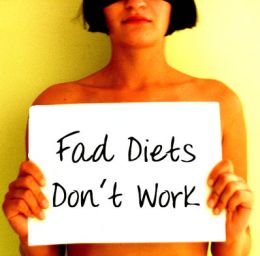How long will the latest food fad last?
 If there’s one certainty I’ve observed in life, it is this: Rather than just eating more produce, less meat, and smaller portions of food, humans will vilify something in an effort to simplify complex food choices. Instead of accepting a “moderation in all things” approach to life — which limits superiority complexes and indulgence — they insist on inventing artificial food guidelines to live by.
If there’s one certainty I’ve observed in life, it is this: Rather than just eating more produce, less meat, and smaller portions of food, humans will vilify something in an effort to simplify complex food choices. Instead of accepting a “moderation in all things” approach to life — which limits superiority complexes and indulgence — they insist on inventing artificial food guidelines to live by.
For example: In the ’80s, butter and natual sugar was bad, so Americans (at least) ate lots of margarine and artificial sweeteners. But those turned out to be worse, so now butter and sugar are back on the menu. In the ’90s, it was the low-fat diet, which in many ways still influences our culture, although not to the extent the diet did in its hey day. In the 2000s, it was low-carbs: Atkin’s diet, South Beach, and other variations. Nowadays, popular grains like wheat bread, oats, and barley are suddenly the enemy. Even though we’ve been eating gluten for thousands of years, it’s just as bad for us as other fad diets. Which is to say it’s not.
These diets get even more extreme and self-righteous, though. Even though humans are omnivores by design — needing meat (but not as much as carnivores) in addition to plants — strict vegetarian, frutarian, and vegan diets always rear their eye-rolling heads. Many of these dieters cheat here and there out of necessity, of course. After all, their omnivore bodies don’t stop craving the benefits of meat. And then there’s organic, which means a tomato from the grocery store may kill you while one from the famer’s market will nourish you—as if “how” our produce is prepared is the real reason for our obesity, rather than the fact that we just quit eating veggies altogether, mass produced or otherwise.
Of course, splinter fads exist, too. Abnormal amounts of people quite drinking milk last decade. Once it became apparent, however, that milk makes everything better — especially cookies and chocolate cake — milk quickly regained its favor among these people. Same goes with injecting yourself with female hormones to lose weight fast, only to gain it back in a couple of weeks.
The take-away: It doesn’t matter what kind of food, approach, or nutrient you vilify, you just need to vilify something. Enemy foods are interchangeable and trendy. For best results, adjust, replace, and flip-flop accordingly. 5-10 years seems to be the norm.
And that, ladies in gentlemen, is food fads done right.
Anyone care to guess what makes the naughty list next? I suspect low-sugar diets will try to take off again in reaction to our ongoing overconsumption of it. But I don’t think it will be that successful because sugar is just too dang sweet to say “no” to. So what’ll it be?
3 Comments
This post is great, Blake. You’ve said everything I’ve been thinking lately.
Here’s something else, though, that you may find interesting. I read once that sometimes “organic” food — though healthy for the body — is harmful to the environment. Local organic is best, but if it’s imported organic, then it’s likely the food came here by barge, which is bad for the environment. Tons of fuel is used to ship fresh produce from other countries. Eating fruit and veggies out of season has similar consequences. (I just can’t stop eating fresh berries, though!)
What I mean to say is — there’s a trade-off to nearly everything. :/
Perhaps a fad in and of itself: http://www.thefresh20.com/
We started this program a few weeks ago and have been happy with it. It forces us to eat better, try new things, be more involved with what we are putting into our bodies and the fact that it prepares my grocery list for me doesn’t suck.
While there are vegetarian and gluten-free options available I tend to agree with you about the hype so I don’t take that seriously. I will occasionally buy organic if I can get local produce, but if I’m buying it from a big box store I don’t.
The best/most simple advice I ever read about nutrition (and I may have read it here) was to stick to the outside of the grocery store. This is where you find all the things that aren’t processed and filled with preservatives.

Well, the current avoidance fad is gluten; before people started to avoid it, I hadn’t heard much of it other than when people suffered from Coeliac disease.
So my guess is that it’ll be something else in the realm of allergies, where some people really suffer from it, but the fad will be for non-sufferers to avoid it, too.